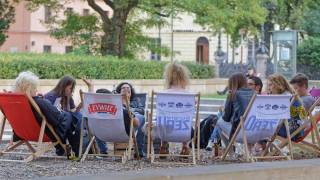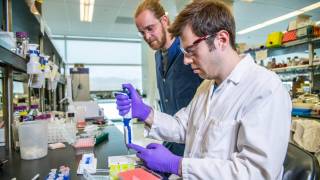Genital Herpes Vaccine Research Continues

For those of you who may have been counting on Genocea's GEN-003 vaccine candidate to treat your genital herpes, there is still hope.
When the Gen-003 genital herpes vaccine was cancelled, it was a sad day for health providers and patients, since there is not an approved vaccine to prevent or treat genital herpes.
Gen-003 is just another example of the pitfalls of vaccine discovery. And the genital herpes virus has been especially challenging.
The Gen-003 failure is disheartening for herpes simplex virus-2 (HSV-2) sufferers, but don't give up.
There are other vaccine candidates under development.
** Schedule Vaccine Appointments Here **
The National Institute of Allergy and Infectious Diseases (NIAID) sponsored a Phase I Study of the Safety of Replication-Defective Herpes Simplex Virus-2 Vaccine, HSV529, in adults aged 18 to 40 years, with or without HSV infection.
Additionally, in early 2017, NanoBio Corporation was awarded a grant from the National Institute of Allergy and Infectious Diseases (NIAID) for the development of an intranasal nanoemulsion (NE) adjuvanted vaccine for the prevention of genital herpes.
"NanoBio's intranasal vaccine is one of the only vaccine candidates we've studied that has shown efficacy in both the prophylactic and the therapeutic animal models," said Dr. David I. Bernstein, Professor of Pediatrics at Cincinnati Children's Hospital Medical Center.
"Based on our data with this unique approach, we look forward to seeing the intranasal NE vaccine progress to human clinical studies," said Dr. Bernstein.
In another herpes clinical study that is defying U.S. safety protections for human trials, Southern Illinois University and a group of investors are backing the offshore testing of an experimental herpes vaccine.
**** Find a clinical trial in 60 seconds ****
Rational Vaccines, a biotechnology company announced in 2016 the completion of the Phase I Trial, the human data collected to date, positions the live-attenuated TheravaxHSV-2 vaccine to be one of the most effective therapeutic vaccines ever created for individuals suffering with herpes simplex virus 1 and 2 (HSV-1 or HSV-2), and suggests a “functional cure” for both HSV-1 and HSV-2 may be on the horizon.
But….. this herpes vaccine did not rely on traditional U.S. safety oversight in the first trial.
Neither the Food and Drug Administration (FDA) nor a safety panel known as an Institutional Review Board, or an “IRB,” monitored the testing of the vaccine its creators say prevents herpes outbreaks.
The results of this study have not been published in a peer-reviewed journal.
Most of the 20 participants were Americans with herpes who were flown to the island several times to be vaccinated, according to Rational Vaccines, the company that oversaw the trial.
“What they’re doing is patently unethical,” said Jonathan Zenilman, chief of Johns Hopkins Bayview Medical Center’s Infectious Diseases Division.
“There’s a reason why researchers rely on these protections. People can die.”
The risks are real. Experimental trials with live viruses could lead to infection if not handled properly or produce side effects in those already infected.
“This is a test case,” said Bartley Madden, a retired Credit Suisse banker and policy adviser to the conservative Heartland Institute, who is another investor in the vaccine.
“The FDA is standing in the way, and Americans are going to hear about this and demand action.”
American researchers are increasingly going offshore to developing countries to conduct clinical trials, citing rising domestic costs. But in order to approve the drug for the U.S. market, the FDA requires that clinical trials involving human participants be reviewed and approved by an IRB or an international equivalent.
The IRB can reject research based on safety concerns.
Robert Califf, who served as FDA commissioner in the Obama administration, said ‘he couldn’t think of a prior instance in which American researchers did not set up an IRB abroad.’
“There’s a tradition of having oversight of human experimentation, and it exists for good reasons,” Califf said.
“It may be legal to be doing it without oversight, but it’s wrong.”
A spokesperson for SIU said the trial wasn’t overseen by the university.
However, after a reporter raised questions about the lack of an IRB, the spokesperson added that the university would “take this opportunity to review our internal processes to assure we are following best practices.”
According to estimates from the Centers for Disease Control and Prevention (CDC), over 24 million people in the United States are infected with HSV-2 and there are 776,000 new infections each year.
***Order your Discreet, Affordable Lab tests today***
Approximately one out of every six people aged 14 to 49 years has an HSV-2 infection.
Our Trust Standards: Medical Advisory Committee
- Study of the Safety of a Particular Herpes Vaccine in Adults With or Without Herpes Infection
- NanoBio Receives SBIR Grant For Genital Herpes Vaccine
- RVX Releases Human Trial Results For Live HSV-2 Vaccine
- Bombs Away: Genocea's Herpes Vaccine Goes Down In Flames
- Genocea's Herpes Vaccine Update: An Interview With Chip Clark, CEO
- Offshore Human Testing Of Herpes Vaccine Stokes Debate Over U.S. Safety Rules
- Genital herpes meets its match: A live HSV-2 ICP0 - virus vaccine that succeeds where subunit vaccines have failed


























